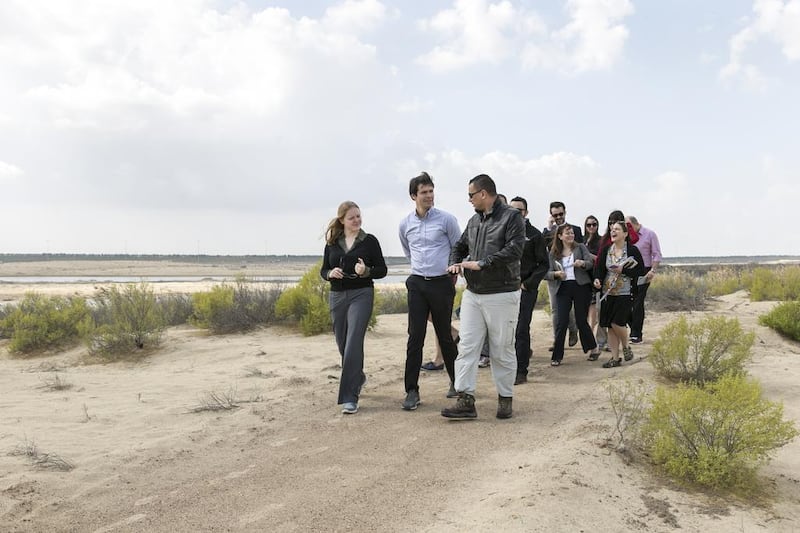ABU DHABI // Harvard University students are visiting sites such as Masdar City and Al Wathba reserve this week on an environment-focused tour of the UAE.
The 35 students from Harvard's Kennedy School of Government are on a seven-day field study that will be an annual part of the Emirates Leadership Initiative, a fellowship and training programme.
“Being here in the Emirates makes us feel definitely closer to the country and that we have a lot to contribute to the country,” said Anoud Allouzi, one of the programme fellows. “We are also learning about how we can help in the future.”
The delegation come from more than 10 countries and have been selected based on their interest in environment and energy policies.
They arrived in Dubai on Sunday and participated in the World Future Energy Summit in Abu Dhabi before kayaking in Abu Dhabi's mangroves on Tuesday and hearing presentations from the Environment Agency Abu Dhabi. Later in the week they will hear a lecture by conservationist Jane Goodall, visit Sharjah, meet Government leaders and go on a desert trip with dune bashing.
The field study will mutually benefit the students and the UAE, said Ruba Al Hassan, senior adviser to the UAE ambassador to the US, Yousef Al Otaiba.
“We in the UAE want to lead this region in promoting good governance and public policy,” she said. “This is the school that builds future leaders.”
The five-year leadership initiative was created with a gift of US$15 million (Dh55 million) from the UAE.
It includes fellowships for graduate students from the UAE and other Arab countries as well as research fellowships for studies on the region and trainings.
Five Harvard faculty visited the country last weekend for a retreat with 45 leaders of Abu Dhabi institutions, Ms Al Hassan said.
“That is, I think, the biggest added value for us — learning from others, people learning from us, and that sharing of expertise to improve the way we do things in the Government,” she said.
Ms Allouzi, 25, from Jordan, and the two other fellows on the trip said they hoped to give back to the UAE.
“The UAE is not thinking regionally. It’s thinking globally,” said Tarig Hilal, a 37-year-old Sudanese public administration student and another fellow.
“There’s this incredible energy and evolution, and sense that anything is possible here,” said Khaled Kteily, 26, a Palestinian-Lebanese fellow studying public policy.
Mr Hilal said he thought the country was exciting and forging the future of the region.
“The Arab world is going to a lot of different places at this point, but there are some really bright spots and this is one of them,” he said.
The field study could allow them to show a counter-narrative about the region, said Mr Kteily, amid reports about escalating violence and conflict elsewhere.
That also reflects their studies in the US, said Ms Allouzi.
“Back at Harvard, instead of just focusing on wars and conflict and resolutions, we’re talking about entrepreneurship in the region, about policy, about the UAE and all these opportunities here,” she said.
lcarroll@thenational.ae






